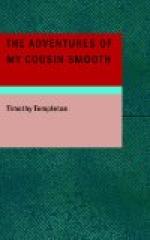the immortal Washington.’ His lordship’s
speech was again interrupted by a demonstration of
surprise on the part of the audience. He paused
a moment, as if questioning the cause. Sir Mathew’s
aid was again called into service; reminding his lordship
that his history was at fault, he added, in a tone
most prudent, ’Not yet one hundred, my lord;
1776 marks the date of the declaration of independence.’
Thanking Sir Mathew for the kindly hint, he apologized
to his hearers, and proceeded. ’One hundred
years, then have hardly rolled around, and we find
that wonderful country presided over by a commoner—the
choice of a free people, who raise him to that proud
eminence once every eight years—vieing
(here Sir Mathew again interrupted by saying, ’Every
four years, my lord!’) with the oldest and most
powerful nations of Europe. Thanks, Sir Mathew,’
interpolated his lordship, rather tartly, turning
round. His Honor now proceeded for some time on
a rather smooth course, except that he left out a
great many h’s and put in a great many a’s.
The great minds of America, he said, had done a world
for her greatness. Here he condescended to pay
what he was pleased to consider a very deserved compliment
to General Flum of New York, whose broad and deeply
wrinkled face he espied at the extreme end of one of
the long tables, where it loomed up like a careworn
lantern amidst a cluster of delicately tinted foliage.
America, said his lordship, sought her great men,
not from among the effete walks of the haristocracy,
from the more legitimate hemisphere—the
common walks of life. With a strange elongation
of the body did our speaker emphasize the remark.
Great men were the gift of an age, and a nation’s
fortune; and with which he was more than happy to
say Hamerica had been blessed—would that
his conscience and love of truth would permit him
to say as much of his own country! He saw the
personification and embodiment of America’s
great minds in the countenance of his much esteemed
friend General Flum, whom his very soul joyed at recognizing
present. (We will here add, by way of parenthesis,
that the knowing ones of New York had a less exalted
opinion of Flum’s talent, which had remained
hid under a pewter pot, but for General Pierce, who
dragged it to the light of day for the purpose of eventually
harmonizing his cabinet). Fortunate was it for
the welfare of a great country that such men existed;
they seemed born to a special purpose, which to him
was a medium of conserving and protecting the great
international well-being of the two peoples. That
purpose was the greatest the world could contemplate
in this great age of pounds, shillings, and pence;
and with such a mind as he knew General Flum possessed,
and the stronger arguments with which the generous
host had conciliated all differences international,
the two countries were sure to continue in a bond
of friendship. To this distinguished compliment
our general was pleased to make an approving bow.
Again, his honor, in compliment of himself, informed




